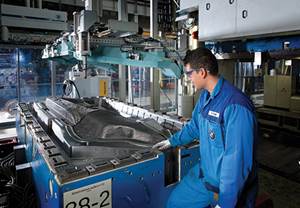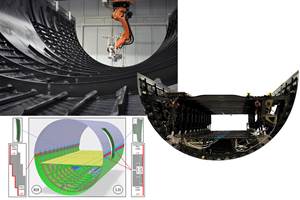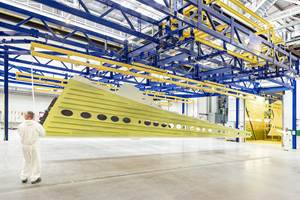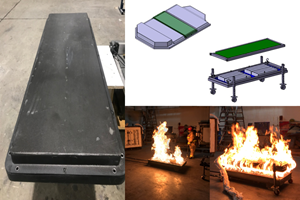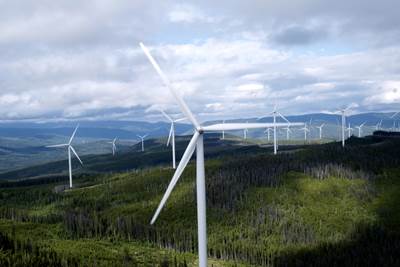In Italy, how one composites fabricator is coping
Lessons learned from Bucci Composites, located in Faenza, Italy, in the heart of the coronavirus pandemic.
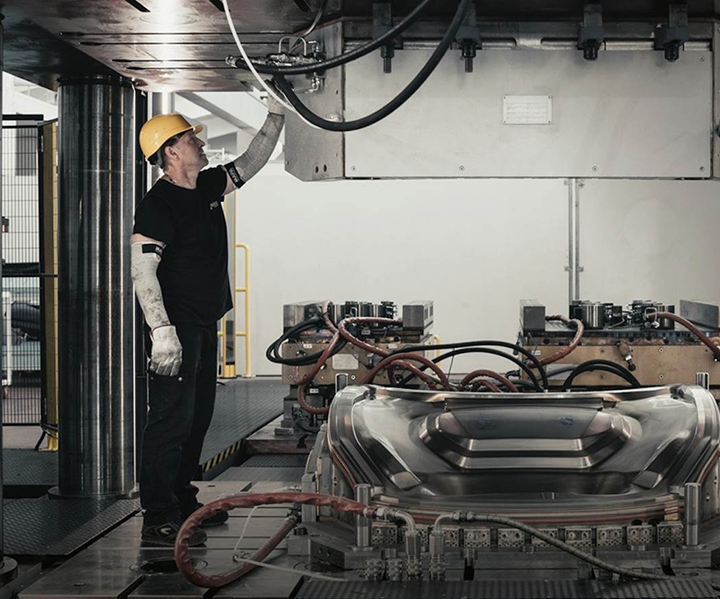
A Bucci Composites operator at one of the company’s compression molding machines. Source | Bucci Composites
Bucci Composites is located in Faenza, Ravenna, Italy, about 40 miles (65 kilometers) southeast of Bologna and 25 miles (40 kilometers) from the Adriatic Sea coast. The company, formerly called Riba Composites, is a fabricator of carbon fiber parts and structures for luxury and premium cars, as well as the aerospace and building and construction markets. Processes run at the facility are compression molding, autoclave-cured prepreg, and high-pressure resin transfer molding (HP-RTM).
Andrea Bedeschi is general manager of Bucci Composites and he talked to CW recently about his and his company experience operating as a composites fabricator in a country that is being severely impacted by the coronavirus epidemic. Bucci, he says, employs about 250 people and, pre-pandemic, ran two shifts per day.
Around the middle of February, says, Bedeschi, the company began to “implement the prescription we received from the industrial company association and the regional prescription on health — washing hands frequently, keeping minimum distance from other people.”
Gradually, Bedeschi reports, Bucci imposed greater restrictions on its employees, including:
- Minimum distance between all employees
- Wearing protection masks when distance cannot be 100% respected
- No groups of people for coffee breaks or lunch
- Restrict access to the factory according to government instructions
- Sanitizing liquid for hands available throughout the plant
- Internal/external meetings done via conference/video calls
- Safety and health education for all employees
As of March 20, Bedeschi says the Bucci facility is operating at about 70% capacity. “We decreased a bit the number of the people working in the company to keep the right distances between colleagues,” he says. “We have also a reduction of active customers on the market and this is causing the need to reduce the capacity. Efficiency of course is affected.”

Bucci Composites’ Andrea Bedeschi. Source | Bucci Composites
Still, maintaining operations is becoming increasingly more difficult. “Food store are closed,” Bedeschi notes. “Exceptionally. we organized a company canteen to support the distribution of the lunches to the people. We also asked our cleaning service company to increase — three times more that the standard — the sanitization of the doors handles, desks and the main surfaces used by people during the day.”
As to recommendations to other manufacturers in Western Europe and the U.S. who are or might face similar restrictions, Bedeschi says, “Follow strictly the rules you receive from the authorities. It is not a game; it is something that can be managed only if you follow strictly the instructions from the authorities.”
As of yet, no Bucci employees have tested positive for coronavirus nor developed symptoms of COVID-19. “The majority of [our employees] are supporting the effort very well,” he says. “I am proud of them.”
March 24 update
Since this story was published on March 23, Italy announced a country-wide lock down, until April 3, of all activities not directly connected to the manufacture of components/systems dedicated to medical devices, or not connected to the food industry. Bucci, therefore, has been compelled to shutdown.
Says Bedeschi: “We spent all today [March 23] and we will spend tomorrow to safely shut down all the equipment of the company and place all the perishable materials in the cold rooms.
“We had several video calls with the top management team and all the first level management team and we directly assisted colleagues on the shop floor to safely shut down activities.
“We informed all the stakeholders (customers and suppliers) of the decision and we inform them that all the office staff is available through computer from home.
“This is to tell you exactly what is happening here in Italy. We are in touch with all the other countries, with customers and business partners, and we see that they are moving in the same direction of Italy — they are just one week or 10 days behind the Italian situation. This means that very soon the situation in the other countries of Europe will follow the Italian one.”
For more on Bucci, see the below stories from CW:
- Articulated composite booms extend reach of concrete-pumping arms
- Unweighting a crane to increase payload limit
Bedeschi can be contacted by email directly at a.bedeschi@bucci-industries.com.
Related Content
Materials & Processes: Fabrication methods
There are numerous methods for fabricating composite components. Selection of a method for a particular part, therefore, will depend on the materials, the part design and end-use or application. Here's a guide to selection.
Read MoreManufacturing the MFFD thermoplastic composite fuselage
Demonstrator’s upper, lower shells and assembly prove materials and new processes for lighter, cheaper and more sustainable high-rate future aircraft.
Read MorePlant tour: Spirit AeroSystems, Belfast, Northern Ireland, U.K.
Purpose-built facility employs resin transfer infusion (RTI) and assembly technology to manufacture today’s composite A220 wings, and prepares for future new programs and production ramp-ups.
Read MorePrice, performance, protection: EV battery enclosures, Part 1
Composite technologies are growing in use as suppliers continue efforts to meet more demanding requirements for EV battery enclosures.
Read MoreRead Next
From the CW Archives: The tale of the thermoplastic cryotank
In 2006, guest columnist Bob Hartunian related the story of his efforts two decades prior, while at McDonnell Douglas, to develop a thermoplastic composite crytank for hydrogen storage. He learned a lot of lessons.
Read MoreCW’s 2024 Top Shops survey offers new approach to benchmarking
Respondents that complete the survey by April 30, 2024, have the chance to be recognized as an honoree.
Read MoreComposites end markets: Energy (2024)
Composites are used widely in oil/gas, wind and other renewable energy applications. Despite market challenges, growth potential and innovation for composites continue.
Read More



















